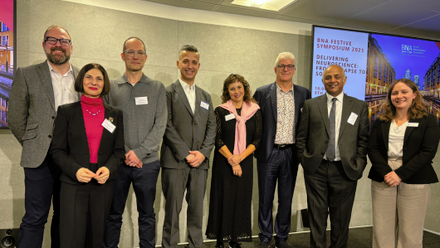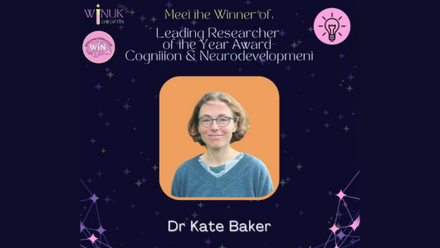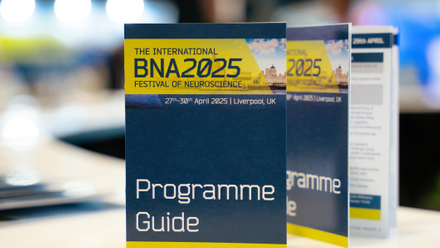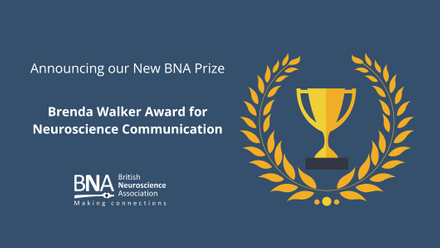Winner of the 2025 BNA Green Neuroscience Award
We are delighted to congratulate the winner of the 2025 BNA Green Neuroscience Prize: Michael Papasavva, Queen Mary, University of London
Dr. Michael Papasavva, representing a multidisciplinary team*, has achieved a landmark in sustainable neuroscience by establishing the first locally solar-powered MRI facility in the world, located in rural Shurugwi, Zimbabwe. This groundbreaking initiative, developed in collaboration with Queen Mary University of London, the Zvitambo Institute, the Gates Foundation Unity Project, and King's College London, directly addresses the critical developmental challenges facing children in sub-Saharan Africa.
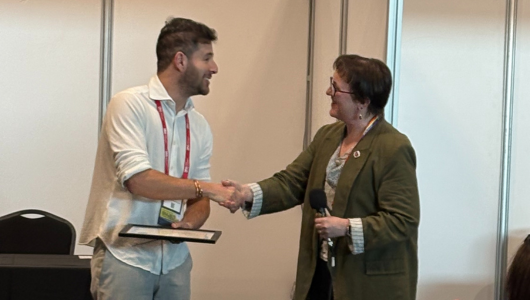
Image of BNA President, Professor Tara Spires-Jones awarding the 2025 Green Neuroscience Prize to Dr Michael Papasavva at the BNA2025 Welcome Reception on 27th April.
As part of the SHINE Study, their work follows over 1,200 children from pregnancy to 10 years, exploring how early-life exposures impact brain development. The team’s state-of-the-art, off-grid research lab includes an ultraportable Hyperfine MRI system, 64-channel EEG, pQCT, ECG, spirometry, and more - delivering comprehensive brain and health assessments in a region where such capabilities were previously non-existent.
Faced with unreliable electricity, the team innovated by powering the facility entirely with solar energy, eliminating dependence on diesel generators and reducing carbon emissions - setting a global precedent for green neuroscience infrastructure in resource-limited settings.
This initiative not only advances neurodevelopmental science in underserved communities but also exemplifies environmental stewardship and capacity-building. Dr. Papasavva and his collaborators have created a replicable model for sustainable, impactful neuroscience - making them truly deserving recipients of the BNA Green Neuroscience Prize.
“Solarising an MRI in a remote, rural setting takes an incredible amount of work. I’m deeply grateful to my colleagues at the Gates Foundation’s Unity Project, Queen Mary University of London, King’s College London, and the Zvitambo Institute for Maternal and Child Health Research for their collaboration and unwavering support. This is especially true for Dr. Niall Bourke and Professor Andrew Prendergast, whose leadership and commitment were instrumental. A heartfelt thank you as well to the dedicated local team in Zimbabwe, whose tireless work on the ground made this achievement possible... A world first for sustainable neuroscience.”
Dr. Michael Papasavva
*Dr Niall Bourke, Dr Joseph Piper, Dr Cynthia Kahari, Carly Bennallick, Prof. Steven Williams, Prof. Andrew Prendergast Prof, Prof. Sean Deoni, Anabel Mutero, Loyce Musiiwa; as well as the Zvitambo Institute for Maternal and Child Health Research, the Gates Foundation Unity Project, The Kings College Institute of Psychiatry, Psychology & Neuroscience & the Queen Mary, University of London Blizard Institute.
What is the Green Neuroscience prize?
Launched in 2023, the BNA Green Neuroscience prize is awarded for efforts by neuroscientists to make positive steps to reduce the environmental impact of their own research activities. These can include:
-
efforts relating to lowering the carbon footprint within the nominee’s research projects, for example relating to key consumables used in the research (such as computing, liquid helium, laboratory equipment)
-
efforts within a nominee’s broader research activities to minimise their carbon footprint, such as maximising lower carbon options for meetings and travel linked to their research.
-
efforts within their broader academic career relating to education and outreach, such as involvement in groups at their institution seeking to respond to the climate emergency, involvement in efforts to reduce an institution’s environmental impact, and efforts to raise awareness of the importance of urgent action responding to the climate emergency.

